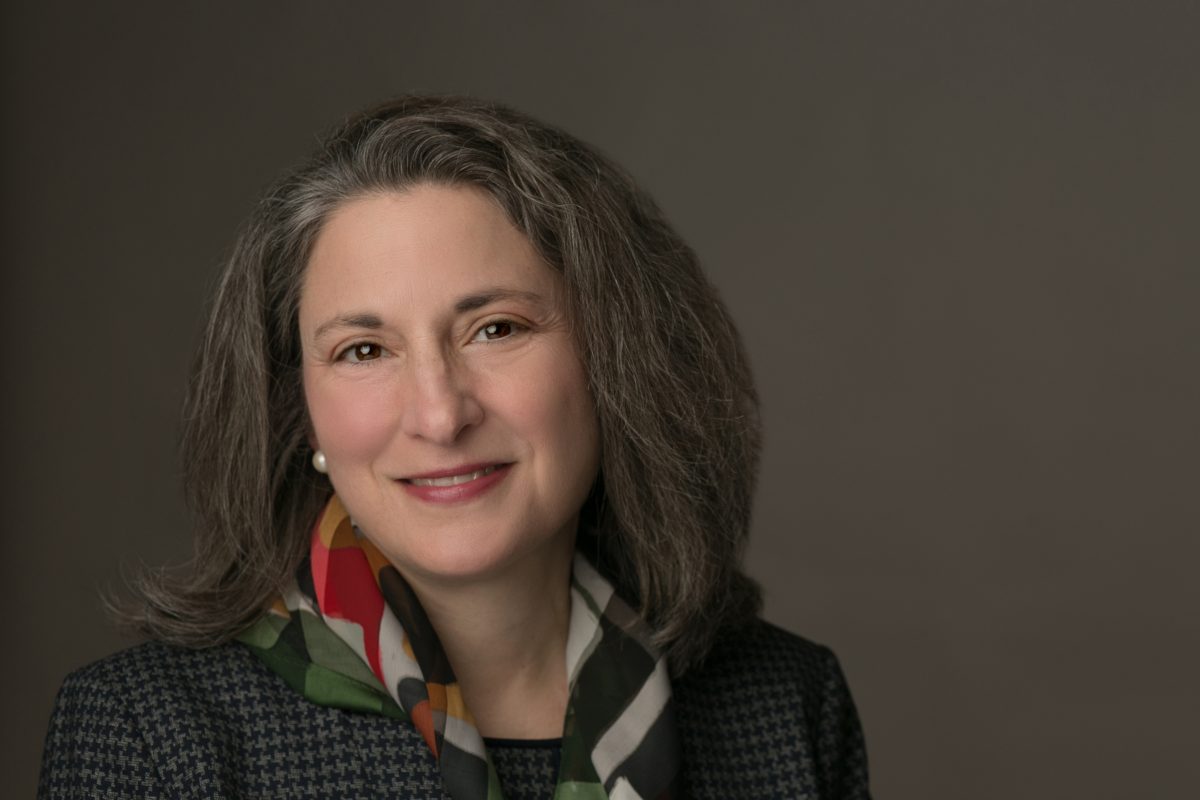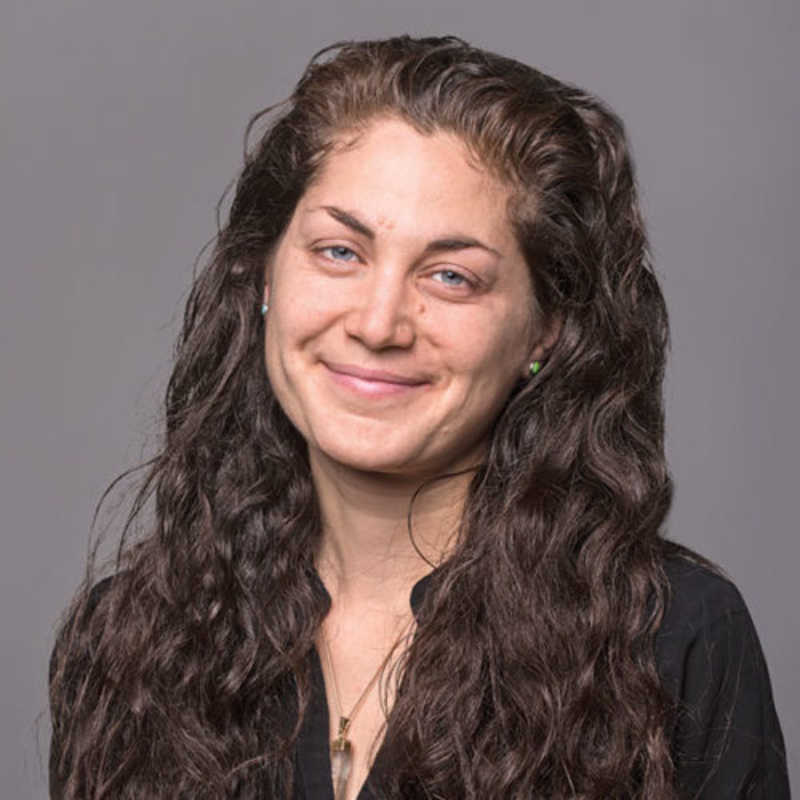
You could say that the humanities have become Phoebe Stein’s life’s work. After teaching writing and literature at Loyola University Chicago and earning her PhD in English, she wanted to gain nonprofit experience and started as an intern at what was then called Illinois Humanities Council (now Illinois Humanities). She later worked in their communications office for eight years before returning to Maryland, her home state, to become the executive director of Maryland Humanities, where she served for nearly 12 years.
February marks Stein’s last month with Maryland Humanities. In May, Stein, 53, will become the president of the Federation of State Humanities Councils, broadening her reach to integrate the humanities into communities across the country. Before her last day, we sat down with Stein to look back on her more than a decade-long tenure with Maryland Humanities.
Humanities is such a broad term. What does that word mean to you, and why do you think it’s important?
Really broadly, what it means to me is the ways humans have understood what it means to be human. That’s what I think the humanities are. Literature, history, philosophy, ethics, the law, journalism, we also have some programs that support archaeology. Here [at Maryland Humanities], we bleed into the social sciences a bit. I think it’s important and I’m proudest of the work that we—and it’s definitely a “we” here—have done to show the value of using those lenses to give context to a current moment, understand the past, and think about the future. I think the humanities really equip us to do that.
Also for me, the humanities are not just areas of study or disciplines; they’re really what happens when we are coming together as communities, and that can be virtual or face-to-face. It is in the interchange, the exchange, and what we’re learning from each other.
You came on board with Maryland Humanities in the summer of 2008, just as the Great Recession hit. How did that affect programming?
When I was interviewing for my job, we were talking about some reserve funds and new initiatives, and it was a very exciting time. Quickly, we were really focused on the bottom line and possible cuts to both public and private funding. We had one grant that was $200,000 and went to $15,000, and we were lucky to get that. That was literally the fiscal reality. When I first got here, we did more with less, and then there were some really lean years where we had to do less with less, but my motto coming out of that was really “more with more.” That’s where we got to.
I’m sure you’ve been doing a lot of reflecting on your years there. What are you most proud of, or what would you like to be remembered for contributing?
I think this idea of demonstrating the value of the humanities to our everyday lives. I’m proud of programs that we did about water treatment and gathering folks together in communities to talk about water treatment, sewage waste, things like that, saying, “How can we think about this as moral or philosophical issue?” Some of that program was called Practicing Democracy. It was intended to bring people with diverse ideological perspectives together to reflect with one another.
We’ve also created some programs to specifically support veterans, and that’s been an honor. We have veterans book groups and some oral history projects. Some of our most recent work has also focused on water, doing two years of programming that looked at the role of water in our lives, not only the environmental impact but also spiritual facets. I’m very proud of some of the work we’ve done to talk about criminal justice reform, with journalists and activists and wrongly-incarcerated folks, to talk about the larger issues at play there—talking about justice, really. So I’m most proud of the work we’ve done to demonstrate the relevancy of the humanities.
What has been some of the feedback from people involved in programs? It must be fulfilling to hear from them.
It is fulfilling. There is certainly a lot that has been said and written about the demise of the humanities, and certainly there are challenges in higher education with the number of students who are majoring in the humanities having had some shrinkage, but from where I sit, the humanities are thriving.
When we have our One Maryland One Book authors travel across the state, people are hungry for this. When we had [Nigerian author] Chimamanda Ngozi Adichie, we had something like 700 people, probably more than that, register for the program and wait hours to meet her and get their books signed and talk to her. And I’ve seen that consistently with other authors, too. People are really hungry for this experience.
When we’re partnering with smaller communities and bringing something like a traveling Smithsonian exhibition, it’s also wonderful to see the community volunteers that come out take pride in sharing their local stories alongside the stories in the exhibit. Or students who participated in our Maryland History Day program will say, “I wasn’t much for history, and now this is the context in which I want to understand the world.” Or there was a female Vietnam veteran who wrote to us and said she’d never told people she’d fought in the war until she attended our book group, and then she felt more comfortable talking about her experience. And I should say, it’s not like we’re empowering people or giving them a voice. They have a voice. It’s more that we provide a forum to come together and learn and listen and share.
Since Maryland Humanities is a statewide organization and there are so many different diverse communities in Maryland, did you target different demographics when you were planning programming? If so, how?
We’re in every county in Maryland and Baltimore City. As part of our most recent strategic plan, we talked about how we could be best proximate in communities, because there are so many diverse communities. Originally, we had this concept that we would have staffed offices in different regions. That developed into regional humanities networks, and now we have five of them.
We have quarterly, community-based meetings, where we’re gathering what we call humanists—that can be someone on an arts council, or a park ranger, or a museum docent—to share what they’re working on and hear how we can support them. That has been a wonderful way to be on the ground, listen to community needs, and seeing if there’s a fit with what we’re offering. The regional humanities networks are Lower Eastern Shore, Upper Eastern Shore, Southern Maryland, Western Maryland, and Capital Region. Some of those are really new.
Let’s talk a little about your new position with the Federation of State Humanities Councils and what you’re looking forward to.
Yes, it’s the membership organization for the 55 state and territorial councils. I’m going to be what they call the president, which is like the executive director. It’s a national role, and I’m very excited for this. I’m really humbled and delighted. When it was time to move on from my almost 12 years here [at Maryland Humanities], I knew what I was going to miss the most was this incredible community. It’s an opportunity for me to support all the state humanities councils, which is just a huge honor, and to advocate for federal and private funding and talk about why it’s important for people to support this work.
So it sounds like you’ll remain connected to Maryland Humanities in this position?
Yeah! They’re one of the members in the organization, and I’ll rely on their perspective. You really need to understand where folks are coming from in their respective areas to best represent them nationally.
